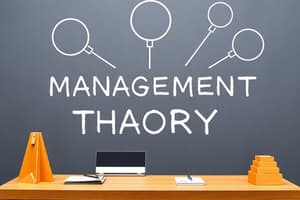Podcast
Questions and Answers
Which of the following best describes management as discussed in the text?
Which of the following best describes management as discussed in the text?
- A combination of science and art
- An art (correct)
- A science
- A business
What is the purpose of a pretest and posttest in management?
What is the purpose of a pretest and posttest in management?
- To measure customer satisfaction
- To assess employee performance
- To evaluate the effectiveness of management techniques (correct)
- To analyze market trends
Is management solely an art?
Is management solely an art?
- The text does not provide enough information
- Yes
- It depends on the context (correct)
- No
Which of the following is NOT a benefit of practical knowledge in management?
Which of the following is NOT a benefit of practical knowledge in management?
Why are personal skills highly valuable in the workplace?
Why are personal skills highly valuable in the workplace?
What can encouraging the development of personal skills through training and mentorship lead to?
What can encouraging the development of personal skills through training and mentorship lead to?
Why is continuous practical application of theoretical principles important in management?
Why is continuous practical application of theoretical principles important in management?
What can recognizing and appreciating the diverse range of personal skills within a team foster?
What can recognizing and appreciating the diverse range of personal skills within a team foster?
Flashcards are hidden until you start studying
Study Notes
Management Definition
- Management involves coordinating and overseeing activities within an organization to achieve goals efficiently and effectively.
- It encompasses planning, organizing, leading, and controlling resources, including human, financial, and physical assets.
Purpose of Pretest and Posttest
- Pretests assess prior knowledge and skills, establishing a baseline for improvement.
- Posttests measure the effectiveness of management training or interventions, helping identify areas of growth and success.
Nature of Management
- Management is not solely an art; it combines art, science, and practical knowledge.
- Effective management requires both creative problem-solving skills and a solid understanding of principles and theories.
Practical Knowledge Benefits
- Lack of practical knowledge can hinder decision-making and problem-solving capabilities.
- Practical experience enhances theoretical understanding, enabling managers to apply concepts effectively in real-world situations.
Value of Personal Skills
- Personal skills such as communication, empathy, and teamwork are crucial for fostering positive workplace relationships.
- They contribute to leadership effectiveness and team cohesion, impacting overall productivity.
Impact of Training and Mentorship
- Encouraging development of personal skills through training and mentorship leads to increased employee confidence and competence.
- It enhances team dynamics and supports a culture of continuous learning and growth.
Importance of Continuous Practical Application
- Regular application of theoretical principles ensures that knowledge remains relevant and applicable in changing environments.
- It aids in bridging the gap between theory and actual practice, leading to improved managerial effectiveness.
Benefits of Recognizing Diverse Personal Skills
- Acknowledging diverse personal skills within a team fosters an inclusive atmosphere that values different perspectives.
- It promotes collaboration, creativity, and innovation, resulting in better problem-solving and decision-making outcomes.
Studying That Suits You
Use AI to generate personalized quizzes and flashcards to suit your learning preferences.




